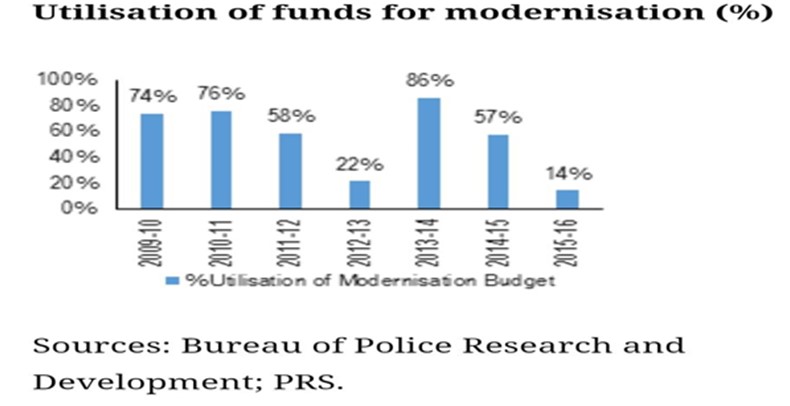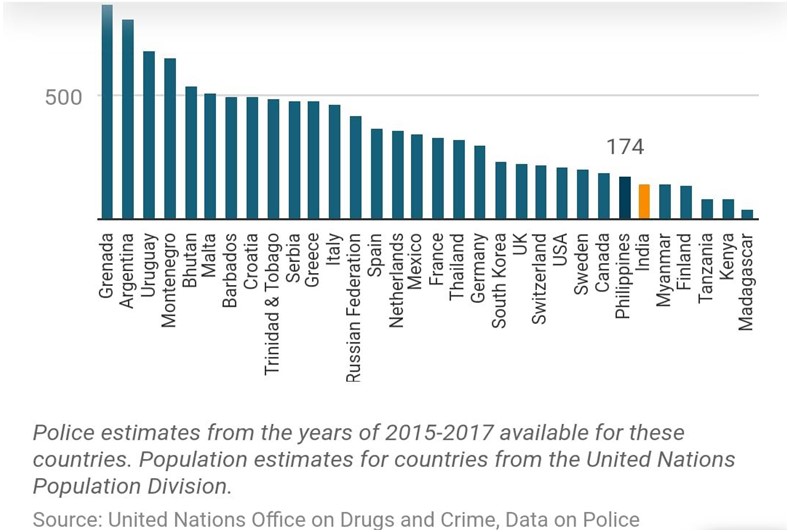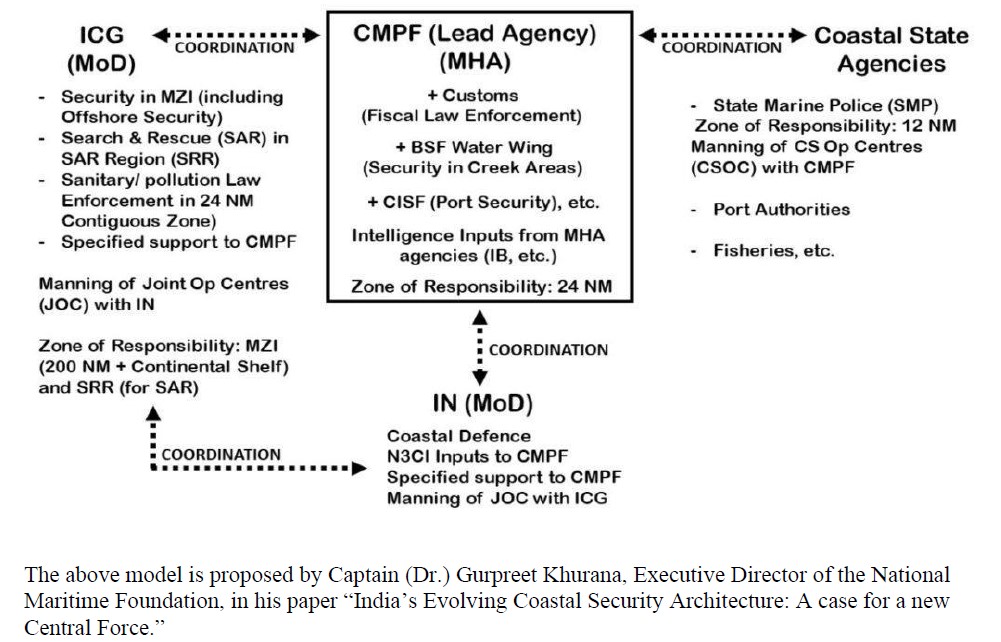ABSTRACT:
India has a vast coastline of 7516.6 km bordering the mainland with 13 states & UTs situated on the coast and 1,197 islands. A Coastal Security Scheme (CSS) has been implemented by the Department of Border Management, MHA in phases since 2005 with the objective of structuring & strengthening the Coastal Police force infrastructure for patrolling & surveillance of coastal areas with the three-layered security apparatus of Indian Navy, Indian Coast Guard & State Coastal Police forces working towards securing the Coast. But to achieve greater operational efficiency & heightened vigilance, the MHA had mulled over the idea of having a Central Marine Police Force with its own cadre, manual & act to be headed by a DG Rank officer as early as 2016. The proposal gathered steam after inputs of Pakistan-based terrorist groups targeting critical infra. along the West Coast was received, on 19th July 2016 the then Home Minister Shri. Kiren Rijiju had responded affirmatively to a question on creation of CMPF in the Lok Sabha and the suggestion for the same had been made by then Maharashtra CM Shri. Devendra Fadnavis in a meeting held on June,16, 2016. The Proposed CMPF has so far not been created and debates around its raising have also gathered attention of masses, as per media reports CMPF could be on the lines of CRPF as the latter does not have power to investigate cases so the raising of CMPF would work as an additional security wing to investigate cases under sec.157 CrPC which had otherwise been left to the discretion of State Police Forces. In Akhilesh Prasad vs. UT of Mizoram AIR 1981, SCR (2) 789 it was held that The Central Reserve Police Force squarely falls within the expression "Armed Forces of the Union" as used in sub-section (2) of section 197 of the Code of Criminal Procedure thus restricting the powers of CRPF but the creation of CMPF could fill the void by having the powers of investigating cases on a fair basis without relying on State Government Sanction. The Public Accounts Committee of the Parliament in 2020 observed that the Territorial Waters, Continental Shelf, Exclusive Economic Zone and Other Maritime Zones Act, 1976 -- which is implemented by the Ministry of External Affairs does not designate any authority that can investigate and arrest individuals and seize vessels that undertake any criminal or anti-national activity, so it favoured for more empowerment & strengthening of ICG in its report. While countries like U.S. have specialized agents in Coast Guard Investigative Service (CGIS) that authorizes them to take up Criminal Investigations in Maritime realm, we lack in this critical area.
OPERATIONAL CHALLENGES FOR IN, ICG & SMP:
The three forces face the following operational issues while safeguarding India’s porous coastline:
● “DIVERSE TOPOGRAPHY” such as creeks, small bays, backwaters, rivulets, lagoons, estuaries, swamps, mudflats as well as hills, rocky outcrops, sandbars, small islands & beaches make it challenging for State Coastal Police forces to have effective surveillance (AR 2011-12 by MHA).
● “MURKY WATERS” with nations like Pakistan, Bangladesh & Sri Lanka pose unique challenges on their own, while Pakistan border remains on high alert for possible terrorists infiltrations like the 22Km stretch of Harami Nala near Sir Creek area which is 10Km from IMBL where Pakistan has given 55 sq. Km. land to Chinese firm for construction[1], the region also witnesses drug busts by ICG, the recent being the case of Pakistani boat Al Tayyasa which was caught by Gujarat ATS 33 nm off the Jakhau coast with 40kg of drugs worth Rs 200 cr[2]. The Indo-Bangladesh Maritime border possesses humanitarian challenges like Illegal Immigration through sea channels[3] and Trawler boats illegally crossing Intl. Border & evading customs[4] the Lankan maritime border faces the challenge of illegal fishing[5] and violation of Maritime Zones of India (Regulation of Fishing by Foreign Vessels) Act, 1981.
● “SECURITY LOOPHOLES” in cases such as Munambam Harbour Human Trafficking case[6] in Kerala where 243 people were missing despite the CSN, AIS systems, VTMS, NC3I systems, EO/IR systems, cameras and meteorological sensors at 46 locations, the investigation hit a dead end with no trace of missing persons. The apprehending of a boat named SS Rafai from Suheli Island off the coast of Tamil Nadu bearing false registration and its possible connections to ISIS indicate towards urgent improvements in coastal security grid which should have stopped the vessel before sailing[7] as it may lead to dangerous consequences of sea borne attacks by non-state actors (Samundari Jihad)[8]
● “LACK OF THEATERISATION, CO-ORDINATION & SYNCRONISATION” pose organisational/structural challenges in effectively receiving intelligence & executing ops. and this affect formulation of SOP’s, conduct of joint ops., setting up of committees, training, coastal community/civilian-Defence personnel equation as the fishermen communities are considered the ‘eyes & ears’ of coast guards, land acquisition & support infra. such as barracks & staff quarters (allocation of resources, as per report only 31% has been utilised under CSS). Multiplicity of authority is another dimension of this problem, while Indian Navy is under the Department of Military Affairs, ICG is under the MoD and Coastal Police comes under the State Governments, this leads to lack of clarity.
● “CONFLICTING JURISDICTIONS” of various forces guarding the Peninsula & overlapping of jurisdictions create confusion among the forces. While guarding Border comes within the purview of National Security under cl. 1 & 2-A of Union List, policing comes under state list so assigning the Maritime/Coastal Police to monitor the TS creates fault lines in NATGRID as these forces are underequipped & it also conflates the responsibility of law and order with maritime border guarding & leads to the problem of overlapping of jurisdiction with IN & CGact, S.14. Another problem is that the terms Maritime Security, Coastal Security, Offshore Security, and Coastline are not defined in any statutory document such as the Navy Act 1957 or the CG Act 1978 or the CCS directive of 2009, so this is a major shortcoming as far as clarity is concerned. As per CCS guidelines 2009, ICG & IN were supposed to do patrolling upto TS & CZ respectively which creates confusion as ICG was supposed to do patrolling upto 200nm & IN after high seas which GOI clarified in a reply to LS that ICG is mandated to do surveillance till EEZ, this complicates existing jurisdictional boundaries[9]. Another conflict concerns the use of the expression’s "coastline" & "baseline". SMP's responsibility for patrolling up to 12 nautical miles from the coast assumes that is the same as the baseline. India reported the baselines of Mainland India, Lakshadweep Islands and Andaman and Nicobar Islands (west) using a system of normal and straight baselines in the 11 May 2009 edition. In many cases, as in the Persian Gulf. Direct baselines were used along the west coast of Kutch and Khambhat and near Wheeler Island on the east coast & the distance between the baseline and the coast is more than 200 km. This leaves a large area of water body unmonitored[10].
● “LACKLUSTRE FORCE” like the various State Marine Police forces that are understaffed & underequipped aren’t the best suited to face the challenges at sea when they’re supposed to monitor activities on the littoral side. In, April 2017, a PAC report of Maharashtra Legislature criticised the gov. for its snail slow pace in upgrading coastal infra. & it noted that 19 new Coastal police stations that were supposed to be set up along the 720km long coastline was still pending[11]. The states are also facing operational difficulties in jetties and maintenance of boats which was earlier being handled by the centre, Gujarat with 30 Marine Police Stations is facing problems of repair & overhaul as it informed the centre that out of 31 boats 7-8 remain non-functional at all times.[12]

Another aspect is the overburdened State Police Force, while the sanctioned strength was 181 officers per 1lkh persons in 2016, the actual strength was even below UN standards of 222 i.e. 137 nos. CAG report also found shortages in State Police weaponry and the Second Administrative Reforms Commission noted that Political executive exercises superintendence & control over police forces for political reasons[13] With Political Interference and shortcomings in Police administration, Prakash Singh[14] judgement assumes greater importance of reforms in State Police which will be possible only with an independent central organisation like CMPF, state marine police due to their limited training fail to recruit locals for intelligence. A CMPF would not work against the Posse-comitatus principle. The HC also came down heavily on State Marine Police for their ineffectiveness in investigating cases like Munambam case[15]. Lackadaisical approach of various state governments towards coastal security also plays a major factor towards a vulnerable coast and states like Gujarat[16] and Odisha are lacking in Coastal infra. as per reports of Police Organizations, 2019 released by MHA.


PRACTICES ADOPTED BY OTHERS TO SAFEGUARD COAST:
GERMANY: The Federal Police of Germany protects its 435-mile-long maritime borders at sea, the ports, near North & Baltic Sea. It carries out surveillance at the Schengen external border along with Federal Customs Administration, its general policing powers extend beyond the outer limit of TS and includes preventing marine pollution, underwater ops., marine research, protection of EEZ in accordance with UNCLOS & its auxiliary units at Cuxhaven, Neustadt in Holstein and Warnemünde are well equipped to carry out Maritime Operations & the federal police is also armed with Helicopters & other overwater flight capabilities. The police is also empowered to investigate cases of piracy and engages in joint ops. in eastern Mediterranean sea[17].
ITALY: The Guardia di Finanza is the Italian Military Police Force under Finance Ministry which was raised to combat financial crimes like Tax evasion w.r.t. VAT & excise duties but vide Leg. Decree no. 177, dated 19 August 2016 the division was entrusted with special responsibilities of Sea security & to perform Its duties effectively, it has Criminal Police powers exercisable for any type of offence in addition to administrative powers of search & seizure and works autonomously through Standard Operating Procedures regd. Investigation[18].Other nations like France have adopted “State Action at Sea” model for effective coastal policing which includes the formation of an organisation under a single authority[19] as France has to enforce its sovereign rights over vast stretch, for enforcing French laws over the maritime Zones, zonal courts are designated.
WAY FORWARD FOR INDIA AND SOLUTIONS:
The following solutions are proposed for effective coastal management & security--------
● The establishment of a Central Marine Police Force (CMPF) under the command of Ministry of Home Affairs as it is the coordinating body on Border security instead of creating a Marine Indian Reserve Battalion (MIRB) as recommended by the Parliamentary Standing Committee on Home Affairs in its 2014 report on CCS as MIRB’s can only act as capability enhancers for states[20] as these battalions are raised by collaboration between center-state with primarily state participation.
● Despite Union assistance, states have failed to mobilize any effective force for coastal security, under the CCS, GOI has incurred an expenditure of Rs.646 cr. & Rs.1580 cr. Under Phases-I & II respectively. The 2015 CAG report states that shortage of manpower ended up being a significant roadblock in the working of 18 marine police HQs of Odisha’s 480Km long coastline[21].
● Another factor is infiltration and to counter this grave threat, CMPF could be deployed at 1376 landing points along the entire coast and to protect the offshore basins of oil and gas reserves such as Mumbai High, Heera, Neelam and Bassein that produce 348,740 barrels per day and strategic installations in Port Blair, Karwar, Kalapakkam etc.
● Resolving Border issues with neighbours can bring stability to security in the region, negotiations between Bangladesh & India on New Moore islands will be a positive step and these disputes affect ICG.
● CMPF would break the State Police-Politician nexus which affects operational efficiency as in many cases state maritime board officials & state coastal police have favoured satellite tracking overactive tracking of fishing boats as politicians want to protect the fishermen community (a crucial vote bank) from security agencies & these fishermen believe that agencies could the signals from onboard transponders to track their often-illegal fishing activity[22].
● The 205th Coastal Security Scheme report of the Parliamentary Standing Committee on March 2018 points to the lack of coordination b/w. IN, ICG and coastal police and recommends a “Clear Chain of Command” for synergy, Operations like Swan[23] did not result in any seizures despite being active for nearly two decades.
● The 177th Coastal Security Scheme in its report on 19th February 2014 advocated for hierarchy in IN, ICG & SMP, the CMPF could replace the understaffed SMP that is struggling to resolve cases on coastline or littoral side of the TS and it would be much more simple to enforce a strict hierarchy between 3 different Central Government agencies.

CONCLUSION:
Having run through the breadth and depth of India’s prevailing coastal security it is clear that less attention has been paid to CS architecture. CMPS can prove effective as it would replace State Marine Police in TS and confine them to the coastline on the littoral side thereby increasing their efficiency even with low numbers. A central agency like CBI for the coasts to investigate, frame charges and exercise all the powers of Policing will aid the Navy and Coast Guard in speedy trial of cases and their disposal which is otherwise caught in red tapism. As exemplified by the KRC report, the political will is necessary to take such steps on ground, a Central Police force would also effectively engage with local population and stay independent in cases, the language barrier can be overcome by a pool of highly trained individuals from different states and backgrounds. The CMPF should have its own act and regulations but under the guidance of NCMCS or IN in its nascent stages and it can also recruit local population for the coasts similar to the Village Defence lines of Kashmir & being a central agency, it would have greater appeal among the masses. Through this doctrinal research work we can see that the Marine Police which works under various states is so far ineffective in handling the threats arising at sea. While its role was conceptualized in Defensive Management and Prosecution it has failed in both the areas.
References:
1 Yash Joshi. (2019, October 20), 26/11 never again, India to have a dedicated Marine Police Force to guard country’s coastline https://tfipost.com/2019/10/26-11-never-again-india-to-have-a-dedicated-marine-police-force-to-guard-countrys-coastline/
2 Anand N, (2022, September 14) Pakistani Boat Seized Off Gujarat Coast with Rs 200 Cr worth Drugs https://www.hindustantimes.com/india-news/pakistani-boat-seized-off-gujarat-coast-with-rs-200-cr-worth-drugs-101663151548217.html#:~:text=According%20to%20Indian%20Coast%20Guard,the%20Jakhau%20coast%20in%20Gujarat.&text=In%20a%20joint%20operation%2C%20the,200%20crore%20on%20Wednesday%20morning.
3 Reuters, (2021, February,26) Indian coast guard rescue 81 Rohingya refugees adrift at sea, 8 dead https://www.hindustantimes.com/india-news/indian-coast-guard-rescues-81-rohingya-refugees-adrift-at-sea-8-died-101614331929547.html
4 Pandey C, (2020, September 12) Fishing trawler, garments worth Rs 3.3 cr en-route to Bangladesh seized https://www.eastmojo.com/news/2020/09/12/fishing-trawler-garments-worth-rs-3-3-cr-en-route-to-bangladesh-seized/
5 The Hindu, (2022, May 02) 6 Sri Lankan fishermen apprehended by Coast Guard https://www.thehindu.com/news/national/tamil-nadu/6-sri-lankan-fishermen-apprehended-by-coast-guard/article65376002.ece
6 Anantha Narayanan K, (2020, January 15) Kerala: Munambam boat people still a mystery https://timesofindia.indiatimes.com/city/kochi/munambam-boat-people-still-a-mystery/articleshow/73257907.cms
7 PTI, (2019, May, 28) ISIS terrorists movement: Lakshadweep admin reviews security, directs high vigil https://www.indiatoday.in/india/story/isis-terrorists-movement-lakshadweep-admin-reviews-security-high-vigil-1537043-2019-05-28
8 PTI, (2019, Jan,2) Pakistan based terror groups training cadre for 'Samundari Jihad': Government https://economictimes.indiatimes.com/news/defence/pakistan-based-terror-groups-training-cadre-for-samundari-jihad-government/articleshow/67347936.cms?from=mdr
9 “Unstarred Question No. 300, Review of Coastal Security”, no. 11
10 The Gazette of India, No. 736”, 11 May 2009. https://www.un.org/Depts/los/LEGISLATIONANDTREATIES/PDFFILES/DEPOSIT/ind_mzn7x_2009.pdf
11 Harsh V. Pant & Maya Mirchandani, (2018) 26/11: A Decade After, ORF Special Report No. 77, https://media.neliti.com/media/publications/430658-critical-evedenciarcy-analysis-of-2611-a-71262ff5.pdf
12 Yatish Yadav, (2018, August 10) Securing India's maritime border: Government contemplating giving greater powers to states https://www.firstpost.com/india/securing-indias-maritime-border-government-contemplating-giving-greater-powers-to-states-4933931.html
13 PRS Legislative Research
14 Prakash Singh v. Union of India (2006) 8 SCC 1
15 Indian Express, (2019, March, 16) Munambam human trafficking: Why wasn’t probe handed over to some other agency, asks Kerala HC https://www.newindianexpress.com/states/erala/2019/mar/16/munambam-human-trafficking-why-wasnt-probe-handed-over-to-some-other-agency-asks-kerala-hc-1951652.amp
16 Jay Pachchigar, (2020 Feb,2) Gujarat: Only 22 marine police stations for 1600Km Coast
17 Maritime Safety and Security Centre of the Federal Government and the Coastal States https://www.msz-cuxhaven.de/EN/GLZSee/Partner/Bundespolizei/bundespolizei_node.html
18 Guardia di Finanza, Who we are: objectives and investigative activities, https://www.gdf.gov.it/en/institutional-tasks/who-we-are-objectives-and-investigative-activities
19 Commander Jeremy B & DR. ERIC F, (2022, March 16) French "State Action at Sea" as a Model for SE Asian Coast Guards, The Maritime Executive, https://maritime-executive.com/editorials/french-state-action-at-sea-as-a-model-for-se-asian-coast-guards
20 Ministry of Home Affairs, Government of India, Annual Report 2015-16 https://www.mha.gov.in/document/annual-reports/annual-report-ministry-of-home-affairs-2015-2016
21 Comptroller and Auditor General Report, (2015-16) https://cag.gov.in/webroot/uploads/download_audit_report/2016/Odisha_General_and_Social_Sector_Report_3_of_2016.pdf
22 Abhijit Singh, (2016, Nov 28) The only reason India may feel safe after 26/11 is because we haven’t been seriously tested yet https://qz.com/india/846652/the-only-reason-india-may-feel-safe-after-2611-is-because-we-havent-been-seriously-tested-yet/
23 Surabhi Rastogi, (2008. Nov.29) Operation Swan is still an ugly duckling, Financial Express, https://www.financialexpress.com/archive/operation-swan-is-still-an-ugly-duckling/392035/


